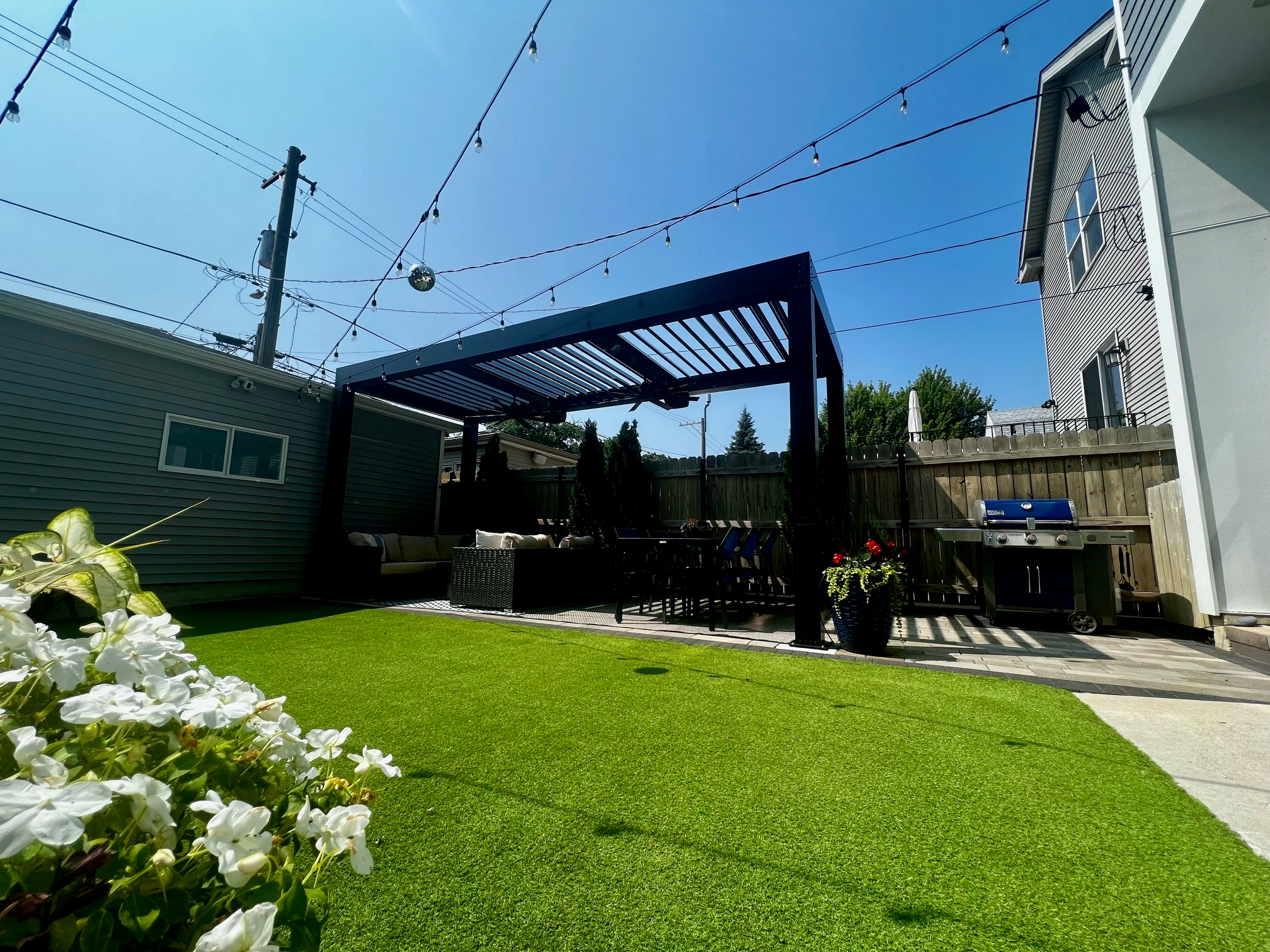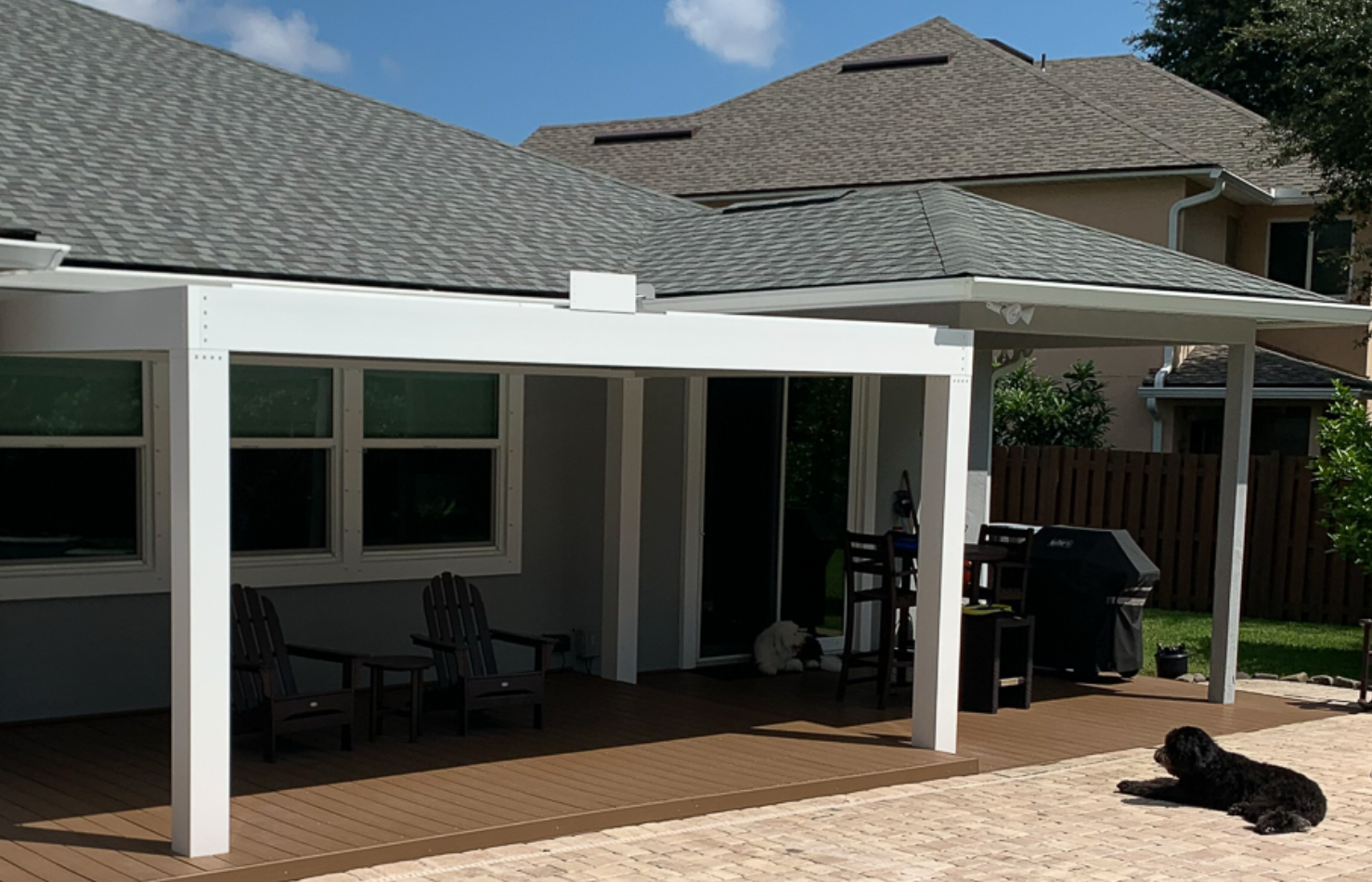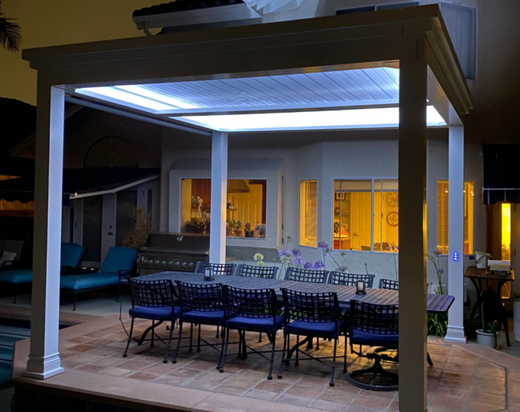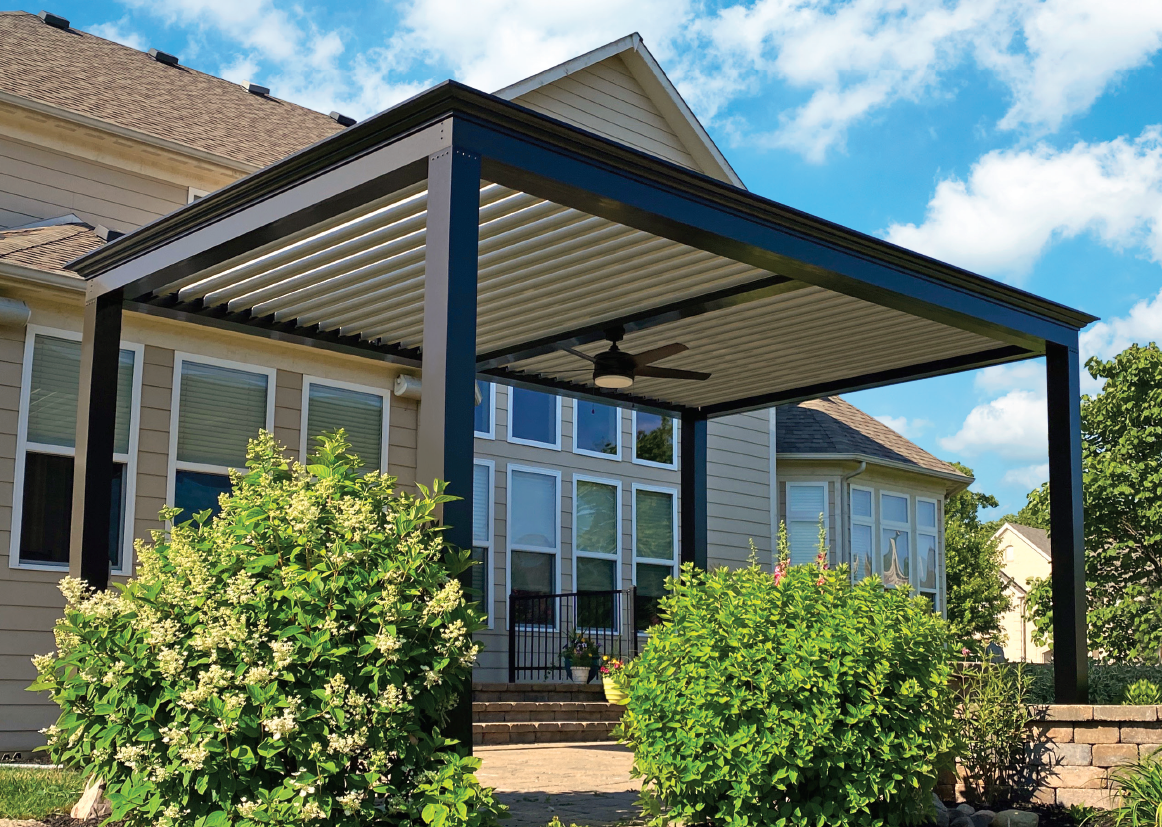Are you dreaming of enhancing your outdoor living space with a beautiful pergola? Before you dive into this exciting project, there’s an important question to consider: do I need a permit for a pergola?
This seemingly simple query can have a significant impact on your plans, so it’s crucial to understand the ins and outs of pergola permits before breaking ground. In this comprehensive guide, we’ll explore the importance of permits, the consequences of neglecting them, and how to navigate the permitting process with ease.
By the end of this blog post, you’ll be equipped with the knowledge to confidently determine whether you need a permit for your pergola project, and how to successfully obtain one if required. So, let’s embark on this journey together and make your dream of a stunning outdoor space a reality!
Short Answer:
-
Make sure when you build a pergola it can handle at least 105 mph wind loads (whether you permit or not)
-
Ask neighbors with pergolas if they got a permit
-
Most of the time, you do need a permit, but there are important caveats
Key Takeaways
-
For any permitting or homeowners association process for a free standing pergola, you will need to make sure it handles AT LEAST 105mph wind loads.
-
Understanding the need for permits is critical to ensure safety, compliance with regulations and legal protection.
-
Complying with local building codes, homeowner’s association rules and special zoning regulations are essential when constructing a pergola.
-
Hiring a professional contractor experienced in local permit requirements as well as conducting regular inspections & maintenance will help ensure successful project completion.
Table of Contents
- Key Takeaways
- Understanding Pergola Permits
- Determining If You Need a Permit
- Local Building Codes and Regulations
- Homeowner's Association Rules
- Historical Districts and Special Zones
- Navigating the Permit Process
- Pergola Kits and Pre-Built Options
- Tips for a Smooth Pergola Construction Project
- Summary
- Frequently Asked Questions
Understanding Pergola Permits

The world of building permits may seem daunting, but understanding their purpose is the key to a successful pergola construction project. Permits provide safety assurances, ensure compliance with local regulations, and shield property owners from potential legal disputes.
Familiarity with when and how to secure a permit is critical as local building codes, homeowner’s association rules, and even historical district regulations can influence the permit acquisition process for your pergola.
Why are permits of such significance? What are the potential consequences of constructing your pergola without one? We will further examine these questions, illuminating the importance of permits in pergola and patio cover construction.
Why Permits Matter
Permits are instrumental in upholding safety standards, certifying that structures like pergolas comply with local building codes, and sidestepping future issues. During the permit process, an engineer reviews your plans to guarantee the secure and reliable construction of patio covers such as pergolas.
This is vital for outdoor living spaces, as local codes often dictate specific requirements like maximum height, clearance, and distances.
Ignoring the need for a permit can lead to a host of issues. By adhering to local laws, building codes, and zoning regulations, you can ensure the safety and stability of your pergola, as well as its compliance with any permitting process that may exist for your area.
So, before you start constructing your dream outdoor space, take a moment to appreciate the importance of obtaining a building permit in the grand scheme of things.
Consequences of Building Without a Permit
Building a pergola without the necessary permits can have serious consequences. You may face fines, be required to dismantle the structure, and even encounter difficulties when selling your property. A home inspection may reveal that your pergola was constructed without the required permits, potentially leading to legal and financial difficulties for both the seller and the buyer.
To sidestep these complications, it’s necessary to secure the appropriate permits before initiating your pergola construction project. By doing so, you can enjoy your outdoor space without the worry of potential fines or the need to remove your beautiful pergola in the future.
Determining If You Need a Permit

Now that we understand the importance of permits and the potential consequences of building without one, let’s explore how to determine if you need a permit for your pergola project. This involves scrutinizing local building codes, homeowner’s association rules, and any special zoning regulations relevant to your property.
While it may seem overwhelming, a systematic approach can make the process of determining if you need a permit much more manageable. Let’s break it down into three key areas to consider: local building codes and zoning laws, homeowner’s association rules, and historical districts and special zones.
Local Building Codes and Regulations
Local building codes and regulations show significant variation depending on your location, and these rules prescribe the prerequisites for securing a pergola permit. It’s essential to consult your local building department to learn about the specific building codes and permitting requirements in your area. They can provide valuable information on materials, height and setback requirements, and fire codes that apply to your project.
When applying for a permit, you must ensure that your building plans are correctly prepared. These plans will need to include details of where the pergola is located in relation to the boundary line and other objects on the property. The size and design of your pergola will determine the need for anchoring it to concrete. This is necessary for increased stability. By comprehending and complying with local building codes and regulations, you can prevent possible future issues and guarantee a successful pergola project.
Homeowner's Association Rules
If your property is part of a homeowner’s association (HOA), you may need to consider additional guidelines and restrictions for pergola construction within your community. Homeowner’s associations often have specific rules in place that govern the design, height, and whether a pergola can be attached or freestanding. It’s important to consult your HOA bylaws and regulations to ensure that your pergola project complies with their requirements.
Ignoring your homeowner’s association rules can lead to fines, forced removal of your pergola, and potential conflicts with your neighbors. By getting acquainted with the HOA guidelines and securing any required approvals, you can dodge these issues and guarantee a seamless construction process.
Historical Districts and Special Zones
If your property is located within a historical district or a special zone, you may be subject to additional regulations and historical district aesthetic guidelines for your pergola. These areas often have strict rules in place to preserve the aesthetic and historical integrity of the neighborhood, which can impact the materials, height, setback, and design of your pergola, as well as its proximity to the property line.
To evade potential fines or the dismantling of your pergola, it’s essential to comply with the guidelines instituted by your historical district or special zone. Consult with local authorities to ensure that your project complies with all relevant regulations, and take the necessary steps to make your pergola a beautiful and compliant addition to your property.
Navigating the Permit Process

Armed with a better understanding of the importance of obtaining the correct permits and how to determine if you need one, it’s time to dive into the permitting process itself. Since a permitting process exists, successfully steering this process involves preparing a comprehensive application, liaising with local authorities, and confirming code compliance.
While it may appear daunting, tackling the permit process with a well-structured plan can make it considerably more manageable. Let’s explore the key steps involved in obtaining a permit for your pergola, from application preparation to code compliance.
Preparing Your Application
To prepare your pergola permit application, you’ll need to gather the necessary documents, including building plans and any required engineer-approved project plans. The specific documents needed will vary depending on your local building department or municipality, so it’s important to gather all relevant information before submitting your application.
Once you’ve secured all the required documents, you can present your application to your local building department for evaluation. Keep in mind that the approval process can take anywhere from a few days to several weeks, so it’s important to plan accordingly and be patient as you wait for a response.
With approval in hand, you can confidently move forward with your pergola construction project.
Working with Local Authorities
Working in tandem with local authorities is a vital part of the permit process. Be prepared to respond to inquiries, provide all necessary paperwork, and follow any directives issued by local officials. Maintaining open lines of communication with your local building department can help ensure a smooth permitting process and prevent any misunderstandings or delays.
As you work with local authorities, it’s important to remain organized and proactive. Keep track of all correspondence, documents, and deadlines to ensure that you stay on top of the permitting process. By staying engaged and responsive, you can help ensure a successful outcome for your pergola project.
Ensuring Code Compliance
Once you’ve secured the required permits, it’s imperative to confirm that your pergola project aligns with all pertinent building codes and regulations. This may involve consulting with your local building department to verify that your plans meet all necessary requirements.
By ensuring code compliance, you can avoid potential fines, removal of your pergola, and legal issues down the line. Adhering to local building codes and regulations not only protects you as the property owner but also ensures the safety and stability of your pergola for years to come.
Pergola Kits and Pre-Built Options

Beyond custom-built pergolas, the market also offers pergola kits and pre-constructed options. These convenient alternatives can simplify the permitting process, as most pre-built pergola kits, like the Luxury Pergola kit, do not require additional permits. However, it’s still important to verify any permit requirements with your local building authorities.
While pergola kits and pre-built options can conserve your time and energy, it’s vital to contemplate any permit stipulations and customization options relevant to your particular project. Let’s take a closer look at permit considerations for pergola kits and how to customize them to meet your local requirements.
Permit Considerations for Pergola Kits
The one pergola kit that meets building codes in the continental United States is the Luxury Pergola, which can handle wind loads of up to 105 mph. This makes it a suitable option for those seeking a permit-compliant pergola kit, as it adheres to the requirements set forth by most local building departments.
When considering a pergola kit like the Luxury Pergola, it’s important to verify with your local building authorities whether any additional permits or approvals are necessary. By doing so, you can ensure that your pergola kit is in compliance with all applicable building codes and regulations, and avoid potential issues down the line.
Customizing Pergola Kits to Meet Permit Requirements
If you need to customize your pergola kit to meet permit requirements, you’ll want to consider the following:
-
Select materials that comply with local building codes
-
Adjust the size and shape of your pergola to meet height and setback requirements
-
Incorporate design elements that align with any applicable aesthetic guidelines
By customizing your pergola kit to meet permit requirements, you can ensure that your project is compliant with local regulations and avoid potential complications. Taking the time to research and plan your pergola customization can help ensure a successful and stress-free construction project.
Tips for a Smooth Pergola Construction Project

With a robust understanding of pergola permits and the permitting process, you’re well-prepared for a successful construction project. To help ensure a smooth experience, consider the following tips: choose the right materials, hire a professional contractor, and conduct regular inspections and maintenance.
By adhering to these tips, you can circumvent common challenges and construct a beautiful and functional outdoor living space enduring through time. Let’s explore each of these tips in more detail, so you can confidently embark on your pergola construction journey.
Choosing the Right Materials
Selecting the right materials for your pergola is crucial for ensuring durability and compliance with local building codes. Consider factors such as climate, exposure to the elements, and the type of materials required by local regulations when making your decision. Some common materials used for pergolas include:
-
Vinyl
-
Pressure-treated wood
-
Cedar
-
PVC
-
Fiberglass
-
Aluminum
By selecting premium materials that align with local building codes and are suitable for your pergola’s planned use and location, you can guarantee a durable and attractive enhancement to your outdoor space with outdoor structures.
Hiring a Professional Contractor
Hiring a professional contractor who is familiar with local building codes and permit requirements can help ensure a successful pergola project. To find a qualified contractor, you can follow these steps:
-
Research their experience and qualifications.
-
Obtain multiple quotes from different contractors.
-
Read reviews from previous clients to get an idea of their work quality and customer satisfaction.
By following these steps, you can find a reliable and skilled contractor for your pergola project.
By collaborating with a proficient and seasoned contractor, you can guarantee that your pergola is constructed to the loftiest standards, complies with all local regulations, and offers a secure and enjoyable outdoor living space for the foreseeable future.
Regular Inspections and Maintenance
Regular inspections and maintenance are crucial for keeping your pergola in good condition and compliant with local regulations. This may involve checking for signs of wear and tear, ensuring that all hardware is securely fastened, and cleaning your pergola regularly to maintain its appearance.
By undertaking regular inspections and maintenance, you can prolong the longevity of your pergola, avert expensive repairs, and ensure its sustained safety and appeal as an addition to your outdoor space. These steps are essential for all permanent structures, including pergolas.
Summary
In conclusion, understanding the importance of pergola permits and navigating the permitting process is crucial for a successful construction project. By determining if you need a permit, following local building codes and regulations, and working closely with local authorities, you can ensure a smooth and stress-free experience.
With this comprehensive guide, you’re now equipped to confidently embark on your pergola construction journey, creating a beautiful outdoor living space that complies with all local requirements and stands the test of time.
Frequently Asked Questions
Do you need permission to build a pergola?
You will need permission to build a pergola, as it is usually a permanent structure and hiring a contractor will help in obtaining the necessary permit. The price for the building permit may vary.
Is a pergola considered an outbuilding?
Yes, a pergola is considered an outbuilding, along with other structures like gazebos, playhouses, club houses, garages, and greenhouses.
Do I need a permit for a gazebo in Florida?
It is necessary to obtain a permit for a gazebo in Florida, as it falls under the same requirements as other construction projects such as home additions or swimming pools.
How can I find out if I need a permit for my pergola project?
To find out if you need a permit for your pergola project, consult your local building department to learn about the specific requirements in your area.
Can I use a pergola kit to simplify the permitting process?
You can likely simplify the permitting process by using a pre-built pergola kit, but it's important to check with your local building authorities to confirm this.






